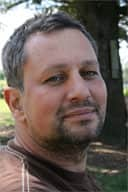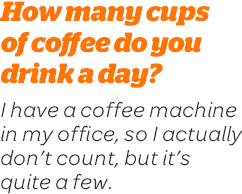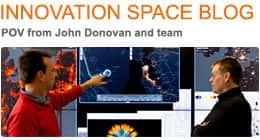 It was the summer of 1979 in Germany, when nine-year-old Oliver Spatscheck built his first computer. It was a simple system, and it took him almost the entire summer to get it to work. But under his uncle's patient guidance that summer, Oliver built something that worked — something that sparked his imagination. "It was exciting to have something built that works, and I still like to do that — to build things, which actually get used and work at the end."
It was the summer of 1979 in Germany, when nine-year-old Oliver Spatscheck built his first computer. It was a simple system, and it took him almost the entire summer to get it to work. But under his uncle's patient guidance that summer, Oliver built something that worked — something that sparked his imagination. "It was exciting to have something built that works, and I still like to do that — to build things, which actually get used and work at the end."
Today Oliver is a researcher at AT&T Labs, where he explores complexities and layer interactions in AT&T's network. "Many people think of the Internet as one layer, but the reality is that it is much deeper than that. Often there are interactions between those layers, and that is where my research is focused."
As a result of this focus, Oliver recently helped lead the core research and development behind AT&T's Application Resource Optimization (ARO) tool — designed to help app developers create more battery and data efficient apps. Put to the task, the tool has already enabled Pandora to increase energy savings by 40 percent.
We recently sat down with Oliver to learn more about his contributions at AT&T Labs and the influences in his life that led him here.

Tell me about some of the projects you're working on...
There are really two projects I have been involved in that have become widespread at AT&T. One is called ARO — Application Resource Optimizer, where we are working on optimizing applications for energy consumption, as well as for being network friendly.
The other one is a project called GS Tool, which measures performance and layer interactions in our wireless and wireline network to help operations address issues in the network.
What was the first project that got you started in computer science?
I started building little electrical circuits, which, when I was young, was very exciting. And then my uncle got me started with my first computer. I spent a couple weeks that summer visiting with him; he would go to work during the day, and every night he would tell me what to do the next day, so I would make progress. It took me pretty much an entire summer to get it to work. I've been playing with computers and electronics ever since.
Is it your uncle who inspired you?
It started with my uncle, but also in school we had a club — and if I translate it into English it would be the "Egghead Club," if that makes sense. My teacher in that club was very inspiring, and we did a lot of stuff between when I was 16 and 18 that really kept me interested.
What was one of your first or most exciting eureka moments where you first thought... okay this is really going somewhere?
It's more of a process, for me, than a particular moment, because usually one thing sort of leads to another. If you look at ARO, it actually started out as a project where we wanted to optimize wireless traffic. So in one meeting we thought, this is a really hard problem, why don't we first start trying to measure the interactions. It turns out that the measurement work is more important than the optimization work.

How would you say your work is making an impact?
If you look at ARO, it helps developers build better applications with longer battery life and better performance, so that clearly benefits our customers. With the GS Tool, we are feeding performance data to our operations team that helps them to fix issues quicker and to be smarter about what to fix, so that also directly impacts the customer experience.
How do you define innovation?
Innovation, generally speaking, is just doing something new. But part of the reason why I ended up at an industrial lab, is doing something new that someone actually cares about. At AT&T I have the opportunity to work on new things that no one has done before, and I have a way of actually getting it used.
What led you to AT&T Labs?
At Labs I really liked the mix of being able to innovate, but still have the opportunity to make a real impact. And you have very smart people from all different kinds of fields, so if I have a question in a particular field, the odds are I can just walk down the hallway and they will give me a really good solution.
Where do you see your work going in the next 5, 10, 15 years?
Well if you look at the theme of my research — looking at the network layer interaction — I think it's only going to get more interesting from a research perspective. If you listen to people talking about cloud computing, all that does is add more layers and complexity into the network, which all have to be managed from a performance and optimization perspective. So projects like ARO will continue, but I think there's more interesting work in the cloud as more layering systems are coming online now.
What advice do you give to young people?
The most important thing is to be excited about what you do. It matters to a lesser extent what you do, because I believe if you are really excited about it, you will be good at it, and that will get you forward no matter what.
Need to access a Web site from your tablet, smartphone or laptop? Getting information from the Web to your device requires a series of complicated interactions between layers in the network.

